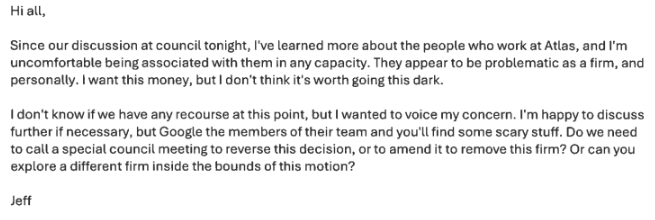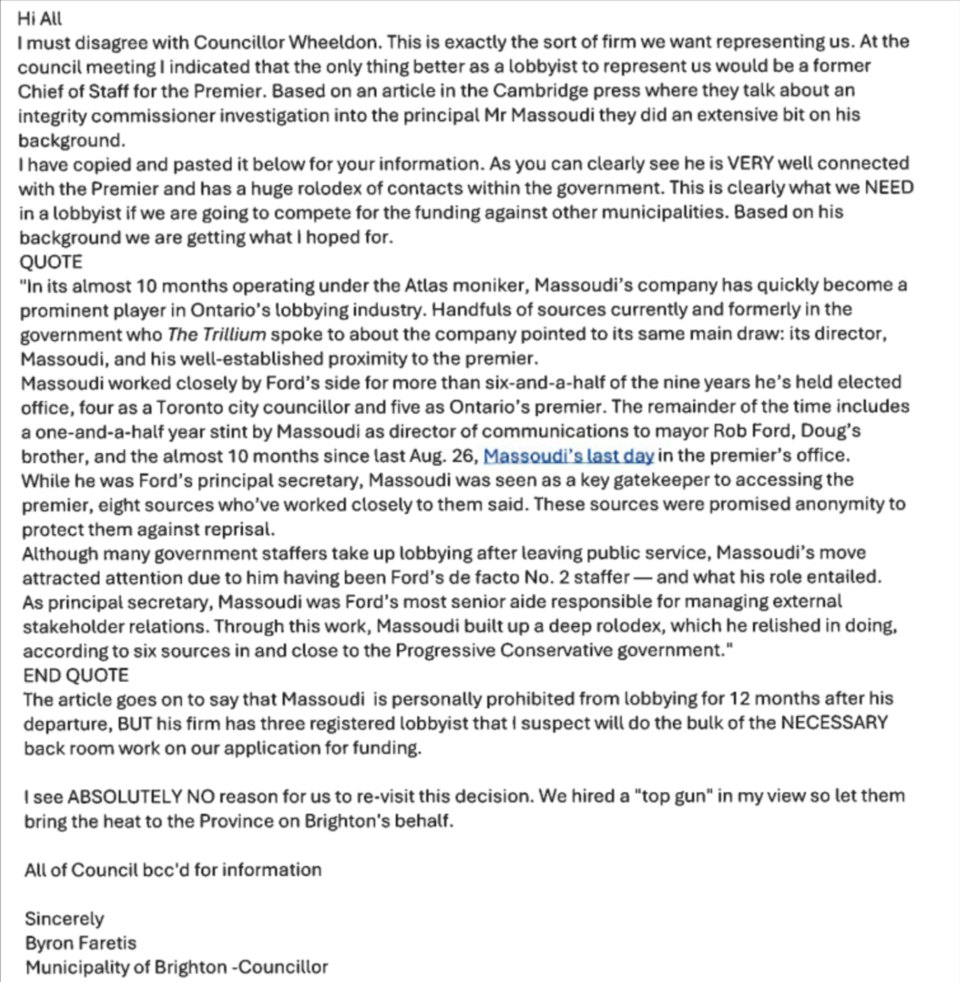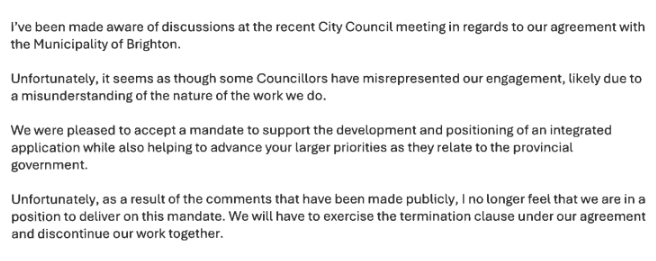When local officials in Brighton, Ont., saw a chance to get some badly needed infrastructure funding, they set out to find lobbyists whose connections to the Ford government could help.
Staff looked at options and circled some favourites.
“Loyalist Public Affairs (Conservative backgrounds, worked for Rob Ford),” wrote the municipality’s planning and development director Paul Walsh to his colleagues on March 28, documents obtained by The Trillium show.
“Amir Remtulla Inc. — former chief of staff Rob Ford (Very active, many clients).”
Finding the right lobbyist wasn’t exactly in the staff’s wheelhouse. None had ever registered for the municipality of 12,500 on the shores of Lake Ontario before.

They settled on Atlas Strategic Advisors — a firm run by Premier Doug Ford’s longtime right-hand man, Amin Massoudi.
When local politicians later publicly discussed how they hoped the firm’s “backroom” connections would land Brighton the money it needs — and the comments made their way to the media — it sparked a controversy 150 kilometres away at Queen’s Park.
The opposition delighted in the idea that councillors believed they needed to hire a friend of the premier to get something done. Cabinet ministers forcefully denied the perception that their government puts its friends first.
To get a closer look at how a small town’s decision caused a ruckus at Queen’s Park, The Trillium requested the emails of those involved through the town’s freedom of information system. The records reveal the deal came together after a suggestion from somebody who rubs shoulders with members of the Ford government from time to time — and show how it fell apart.
Immediately after approving the deal with Atlas at a May 6 council meeting, some of its members looked deeper into the firm, finding The Trillium’s reporting on Massoudi, including how, as the premier’s principal secretary, he went on a Las Vegas trip with a Greenbelt developer.
Coun. Jeff Wheeldon was among those who quickly regretted the deal. An hour after the meeting wrapped up, he wrote municipal staff to see if there was a way out. He said he was “uncomfortable being associated with them in any capacity.”
“I want this money, but I don't think it's worth going this dark,” he wrote.

For another councillor, the same set of facts was an asset.
“I must disagree with Councillor Wheeldon. This is exactly the sort of firm we want representing us,” wrote Coun. Byron Faretis.
“As you can clearly see he is VERY well connected with the Premier and has a huge rolodex of contacts within the government. This is clearly what we NEED in a lobbyist if we are going to compete for the funding against other municipalities,” he continued.
Massoudi has been one of Ford’s closest and most loyal aides during their deeply connected careers in politics. Massoudi worked for Ford and his late brother during the pair’s 2010 to 2014 stint at Toronto City Hall. He later worked in the premier’s office from after the June 2018 election until a few months after the
Progressive Conservatives’ 2022 re-election — most of which he spent as Ford’s second-ranked staffer.
The three other Atlas lobbyists worked previously in the Ford government and left it within the last two years.
Walsh, Brighton’s planning director, pitched Atlas as an option after his wife — a member of the Police Association of Ontario’s (PAO) board — suggested the firm.
The association told The Trillium it “has a working relationship with Atlas,” which provides the PAO “strategic advice.”
Atlas lobbyists are registered to lobby provincially for about two dozen clients, but not the PAO.
The PAO advocates for over 28,000 police personnel from 45 member associations, including almost 10,000 from the Ontario Provincial Police Association. It works closely with the Ford government. Its lobbying work “is usually done in-house and occasionally by other consultants as shown in the Ontario lobby registry,” the PAO said in a statement.
The Trillium attempted to reach the planning director’s wife at a PAO email address but did not hear back before publication.
Confusing matters, Walsh appears to have mixed up Amin Massoudi and Amir Remtulla, and their firms, with one another in a few different emails he sent in early April, including calling Amin “Amir” at one point.
Walsh emailed Bob Casselman, Brighton’s then-chief administrative officer, on April 2, writing of the firm his wife recommended — while also referring to it as Amir Remtulla Inc. — that, “Apparently, he is able to get (the PAO what) they want most times.”
“If it’s a request he can’t make happen, he says so up front,” Walsh wrote to Casselman.
The PAO has never worked with Remtulla, according to the association. Neither Remtulla nor anyone working for his firm has also never registered to lobby for the PAO either.

The funding Brighton is seeking is a top priority for the town. It’s grappled since the late 2000s with potentially harmful high ammonia levels in its water. The province’s Ministry of the Environment, Conservation and Parks recently signalled it could require new developments to be halted in Brighton if its wastewater treatment system isn’t upgraded.
The upgrade needed has been priced at $30 million or more — a cost roughly matching the municipality’s entire annual budget.
On March 21, the Ford government announced a fourfold increase to the Housing-Enabling Water Systems Fund (HEWSF). It now plans to provide $825 million to municipalities to help them upgrade water infrastructure “needed to build more homes.”
The HEWSF funding increase meant good news for Brighton, whose staff had long worked with design consultants J.L. Richards on an upgrade proposal leading up to its submission for HEWSF funding.
Around two weeks before the April 19 HEWSF application deadline, Walsh started reaching out to lobbying firms, having narrowed the field to include Atlas, Remtulla’s business, and Loyalist.
On Friday, April 5, Walsh emailed Massoudi, saying, “I was referred to you by a board member of the Police Associations (sic) of Ontario.”
“The services of an effective lobbyist is needed in the area of infrastructure grants with the Ontario government,” Walsh wrote.
Massoudi and others from Atlas chatted with Walsh and another staffer the following Tuesday, April 9, emails indicate. Atlas followed up with its engagement plan later that day.
“They (Atlas) come well recommended, and will be sending in a proposal,” Walsh wrote that afternoon to Elana Arthurs, who officially joined the municipality the day before, replacing Casselman, who retired, as its new chief administrative officer. “I’m told they don’t take on projects that they feel don’t have good promise, and said as much.”
Within a few days, Atlas was helping Brighton’s staff fine-tune the cover letter of its HEWSF application. The municipality also began collecting letters from local developers stressing the impact of halting development.
The municipality applied for a HEWSF grant on the April 19 deadline.
Brighton’s council’s next regular meeting was on the evening of May 6. Its agenda was set to include a discussion and vote on hiring Atlas to provide “strategic communication advisory services” under an up-to $60,000 six-month contract. Hours before the meeting, councillors Bobbi Wright and Anne Butwell each contacted municipal staff questioning the lobbying agreement, emails indicate.
Council voted to seal the Brighton-Atlas deal that evening. Comments made by some members also set up its collapse.
“Put plain and simple, it's a lobbyist to work the backroom,” Faretis, a councillor who worked in government relations for part of his career, said during the 15-minute discussion about the agreement at the May 6 meeting. “That's what we are getting. We are not acquiring them for their technical expertise — we have J.L. Richards for that."
“As much as it sometimes burns me that this government sometimes talks to its friends more than other folks, it might as well work for us from time to time,” Wheeldon added, which Mayor Brian Ostrander responded to saying, “Hear, hear. On so many levels.”
Ostrander, Faretis, Wheeldon and two other councillors voted in favour of signing the agreement with Atlas. Butwell voted against it, while Wright abstained.
Wheeldon — the councillor who wrote staff saying it wouldn’t be “worth going this dark” shortly after the meeting ended — quickly looked into ways to undo council’s decision.
“Since our discussion at council tonight, I've learned more about the people who work at Atlas, and I'm uncomfortable being associated with them in any capacity … Do we need to call a special council meeting to reverse this decision, or to amend it to remove this firm?” Wheeldon wrote in an email at 8:16 p.m. on May 6.
Faretis disagreed. “I see ABSOLUTELY NO reason for us to re-visit this decision. We hired a ‘top gun’ in my view so let them bring the heat to the province on Brighton’s behalf,” he wrote in a response.

Early the next morning, Wheeldon wrote back, saying Massoudi’s involvement in the infamous Las Vegas trip that contributed to the reversal of the Greenbelt changes and his Atlas colleagues’ proximity to the same scandal “is a big deal for me.”
The Brighton Community Gazette, a local newsletter, was the first to report on the lobbying agreement, and council members’ public comments about it, the next day. Its reporting ignited a firestorm on a Brighton community Facebook group. In one post, the mayor criticized the newsletter, referring to it as the "Brighton Gaz.-lighter.”
On the same day, May 7, Ostrander emailed David Piccini, the PC MPP for riding including Brighton, Northumberland—Peterborough South. In a letter, the mayor said Brighton’s council “unanimously supported the necessary initiatives undertaken to support the funding (application),” before noting the actions included “the support of communications specialists.”
In the months leading up to the HEWSF application deadline, Piccini or his staff had flagged the grant program to Brighton’s mayor or the town’s staff several times, emails show.
Later that week, Piccini told The Trillium he first learned Brighton hired Atlas from Ostrander’s letter. One Atlas lobbyist worked as Piccini’s assistant a few years ago.
“David Piccini called me last night, very offended that we have hired a lobbyist rather than just going to him,” Wheeldon wrote in an email to Walsh on May 8.
“I really did not anticipate David having that response,” Walsh responded.
“A staff person with Atlas just had lunch with David the day before we interviewed them (or so he said),” Walsh added.
Asked whether any such meeting took place, Piccini’s spokesperson responded, “No.”
In emails the next day, the two councillors who hadn’t voted in favour of the agreement emailed the mayor objecting to the idea the Atlas deal was “unanimously supported.”
Over the two days following the council’s May 6 meeting, its members and municipal staff discussed if — and how — the deal could be undone, along with how they could remedy the fallout from it.
On the afternoon of Wednesday, May 8, The Trillium began contacting several people involved. At 5:42 p.m. that evening, Massoudi emailed Walsh and Whiteman, pulling the plug on their agreement.
“Unfortunately, it seems as though some councillors have misrepresented our engagement, likely due to a misunderstanding of the nature of the work we do … as a result of the comments that have been made publicly, I no longer feel that we are in a position to deliver on this mandate,” Massoudi wrote Brighton’s directors.

Massoudi said similar to The Trillium in an email later that evening.
NDP Leader Marit Stiles used the saga as ammo to lead off the next day’s question period at Queen’s Park.
“Where did this town in the minister of labour’s riding … get the idea that in order to get action from this government they needed to hire a friend of the premier to lobby for preferential treatment?” Stiles asked with her first question.
“Frankly, I don’t know where a town or any community in this province of Ontario would think that it would ever be a good idea to hire an outside lobbyist to try to connect with the government or members of this legislature,” Minister of Municipal Affairs Paul Calandra responded.
Afterwards, Calandra told reporters municipalities are “wasting… money” if they’re hiring lobbyists.
The same day, Piccini described what unfolded as “disappointing,” and said council members’ comments “reflect a fundamental misunderstanding of even the lobbying act.”
Atlas billed Brighton $10,000 for April’s work on May 1. The day after Atlas withdrew from the deal, Arthurs emailed Walsh saying, “I think we should request a revised invoice for the actual work completed,” given that their agreement ceased.
Before the publication of this story, neither Arthurs nor Walsh had responded to questions The Trillium emailed them, including about whether Brighton had paid Atlas for a full-month’s work.
On May 21, Brighton’s council met again. They briefly discussed a letter Piccini wrote to its members expressing his disappointment in what unfolded. The only council members to speak about the ordeal at the meeting were Wheeldon and Ostrander.
During a three-and-a-half-minute long speech, Wheeldon acknowledged he’d “made a mistake in this chamber” by letting out “frustrations about our political system in the form of words that, lacking context, or further explanation, and in combination with the words of others, could be taken to mean many things.”
“Moving forward, my goal is to ensure that I am clear, thoughtful and humanizing in these discussions, rather than to vent or stay silent,” Wheeldon added.
Ostrander thanked Wheeldon for his comments and said “the words used during the (May 6) meeting were no doubt regrettable.”
“Pushing those words — which would then be used by the opposition and other activist media outlets at Queen’s Park — was certainly not at all helpful,” the mayor added.
The Ministry of Infrastructure’s website does not say when it’ll announce recipients of the HEWSF grants. It does note that projects receiving funding must start no later than the end of this September.
According to a ministry staff member, it had received 208 applications for grants from the HEWSF program as of mid-May.




